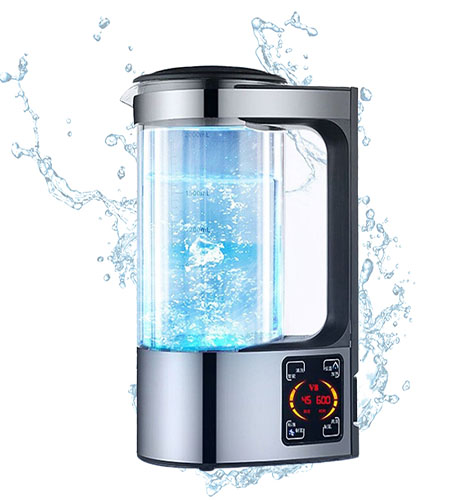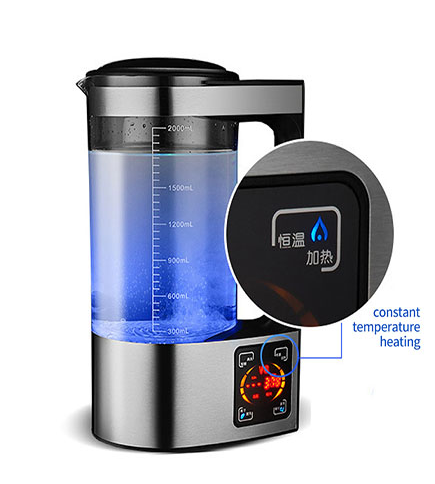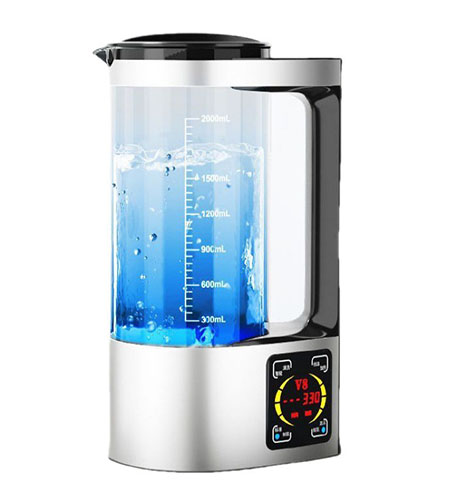
Eftersom hälsa och välbefinnande fortsätter att vara en hög prioritet för många individer har Minter tagit sig an utmaningen genom att skapa innovativa produkter som stöder det övergripande välbefinnandet. En sådan produkt är vår avancerade vätegenerator, som tar hydratisering och hälsa till nästa nivå. Eftersom vatten är en viktig komponent för att upprätthålla en balanserad och hälsosam livsstil erbjuder kombinationen av Minters vätegenerator och våra andra hälsoprodukter en allomfattande lösning för att säkerställa maximalt välbefinnande för våra kunder.
Vår vätevattengenerator, driven av Minters engagemang för innovationer inom hälso- och sjukvård, producerar vatten med väte - ett ämne som vetenskapligt bevisats ge många hälsofördelar, inklusive antioxidanter och förbättrad vätskeförbrukning. Detta underverk av modern teknik överensstämmer perfekt med vårt varumärkes uppdrag att leverera högkvalitativa, omfattande hälsoprodukter, som vår väteinhalator och vätevattenflaska. Genom att ta in vätefattigt vatten i din dagliga rutin kan du uppleva ökad energi, minskad oxidativ stress och förbättrad ämnesomsättning, samtidigt som du utnyttjar bekvämligheten med Minters vätegenerator.

I området för fysisk kondition finns inget viktigare än kreativitet när det gäller att komma på apparater som gynnar människor. Minter vätevattengeneratorn är en sådan spelväxlare bland många andra hälso- och sjukvårdsprodukter. Vårt mål på Menter är att erbjuda effektiva och trovärdiga hälsovårdssystem och denna vätevattentillverkare är inte mindre än det. Denna fantastiska maskin producerar vätefattigt vatten som har många hälsofördelar.
Anledningen till att man tillverkade mintervätegeneratorn var att ge vatten av hög kvalitet som berikats med väte och som man trodde neutraliserade fria radikaler samt minskade oxidativ stress i kroppen och därmed förbättrade den allmänna hälsan. Denna enhet kan användas av alla eftersom den är enkel att använda och underhålla, och därför kommer de inte att ha några problem när de använder den utan istället koncentrera sig på att njuta av dess fördelar enkelt. Om du letar efter hälsoprodukter, så leta inte längre än hos oss här på Minter där allt vi gör kretsar kring excellens i serviceleverans mot våra kunders välbefinnande.

Minter är en ledande leverantör av nya hälso- och sjukvårdsprodukter. De har nyligen introducerat sin vätegenerator som är utformad för att ge rent hydrerat vatten för bättre hälsa. I den här artikeln kommer vi att tala om fördelarna med att använda en vätegenerator och hur den kan förändra ditt liv när det gäller att hålla dig frisk och frisk.
På senare tid har vätevatten blivit allt mer populärt främst därför att det har visat sig ha många hälsofördelar. När man lägger till väte i vatten reagerar det på molekylär nivå och därmed producerar oxidation som fungerar som en antioxidant som tar bort skadliga fria radikaler från våra kroppar. Detta bidrar till att minska inflammation, förbättra matsmältningen och stödja immunförsvaret bland annat. Dessutom har studier visat att drickandet av denna typ av vatten kan hjälpa till med viktminskning, förbättra hudens färg och till och med öka energinivåerna under idrottsutövningar. Alla dessa vinster kan uppnås från ditt hem genom att använda Minters vattengenerator.

Presentera Minters avancerade vätevattengenerator – en produkt som är utformad för att förändra hur individer tänker på hälsa i sin vardag. Som en av de ledande tillverkarna av hälso- och sjukvårdsprodukter inser vi behovet av att integrera innovativa teknologier i vårt sortiment. Vår enhet producerar rent väteinfunderat vatten som har många fördelar, inklusive ökad antioxidantnivå, bättre cellfunktioner bland annat. Prova något nytt med hydrering idag genom att testa denna maskin.
Kvalitet har alltid varit i centrum för allt vi gör på Minter och ingenstans är detta mer uppenbart än i vår vätgasvattengenerator. Denna affär-till-affär-apparat har skapats med oöverträffad precision vilket gör den inte bara effektiv utan också användarvänlig och därmed perfekt för alla företag som vill förbättra personalens eller kundernas välbefinnande. Den kan enkelt installeras i små utrymmen tack vare sin kompakta design samtidigt som den fortfarande lyckas driva energisparande så att driftskostnaderna förblir minimala, så lita på oss när vi säger att alla dessa faktorer beaktades under tillverkningen.

Vårt register på Minter talar för sig självt. Vi är kända för våra innovativa hälso- och sjukvårdsprodukter som prioriterar välbefinnande och långt liv. Vår senaste produkt, Minter Hydrogen Water Generator, har förändrat allt när det gäller dricksvatten med väteinfusion. Denna banbrytande apparat är tillverkad med företag som vill förbättra sina produkter genom att ge dem en hälsosam twist i åtanke.
Minter vätevattenskärarens kompakta konstruktion gör att den kan passa i små utrymmen utan att förlora prestandan. Den kan användas i olika kommersiella miljöer på grund av sin höga prestanda som uppnås genom miniaturisering. Enheten använder avancerade tekniker som dessa för att skapa massor av väteatomer som lätt kan lösas upp i vatten. Eftersom denna generator är enkel att använda och har en kort produktionstid, kan företagen snabbt betjäna hälsovårdande kunder utan att kompromissa med kvalitet eller hastighet under processen. Vi på Minter tror på att företag ska kunna erbjuda de bästa lösningarna för hälsa och fitness.

Zhengzhou Minter Medical Devices Co., Ltd. är en professionell leverantör av hälso- och sjukvårdsprodukter. Med många års erfarenhet har Minter sitt eget specialiserade forsknings- och utvecklingscenter samt tillverkningsbas för medicinsk utrustning.
Från noggrant urval av råvaror till strikt inspektion av produkter ser vi till att varje steg uppfyller de högsta kvalitetsstandarderna. Nu har de flesta Minters produkter passerat CE, ISO, ROHS, FCC och andra certifieringar.
Våra huvudprodukter är hälsovårdsprodukter såsom väteinhalator, vätevattenflaska, tandvårdsprodukter, massageprodukter och fysioterapiutrustning.
Eftersom vi alltid prioriterar kundnöjdhet och ger utmärkt support efter försäljning, har våra produkter vunnit stor popularitet bland kunder från Nordamerika, Sydamerika, Västeuropa, Östeuropa, Sydostasien, etc.
Vår forskning och utvecklingsavdelning ger starkt tekniskt stöd och gör det möjligt för oss att erbjuda OEM och ODM till utländska kunder över hela världen. Vi välkomnar varmt kunder från hem och ombord att komma för att besöka vår fabrik och etablera samarbetsförhållanden med oss. Vi ser fram emot att få mer samarbete.
Vi har ett elitteam med fokus på produktforskning och utveckling och samarbetar med ett antal välkända universitet för att uppnå strategiskt samarbete inom produktion, utbildning och forskning, introducera internationell avancerad teknik och integrera i produkter.
Med ett åtagande för excellens, implementerar Minter strikta kvalitetskontrollåtgärder genom hela produktionsprocessen. Från noggrann urval av råmaterial till grundliga produktinspektioner, följer varje steg de högsta kvalitetsstandarderna. Denna hängivenhet till kvalitetsgaranti resulterar i produkter som konsekvent uppfyller eller överträffar regulatoriska certifieringar som CE, ISO, ROHS, FCC, vilket säkerställer tillförlitlighet och säkerhet för kunder världen över.
Vi tillhandahåller OEM/ODM-tjänster och professionell teknisk support för alla kunder som skickar prov på produkterna, vi kommer att designa och utveckla bättre baserat på prov. För varje kund,vi kommer att välja det bästa materialet,och även innovativt material för deras produkter.
Minters betoning av kundnöjdhet och utmärkt efterförsäljningssupport har drivit dess produkter till stor popularitet över olika regioner inklusive Nordamerika, Sydamerika, Västeuropa, Östeuropa och Sydostasien. Denna omfattande beröm visar varumärkets förmåga att resonera med en global publik och etablera en stark närvaro på nyckelmarknader.
Mintergeneratorer använder avancerad elektrolytisk teknik, vilket säkerställer hög vätekoncentration och renhet för maximalt hälsofördelar.
Ja, Minter vätegeneratorer är utformade för effektivitet och ger en jämn vattenström berikad med väte, perfekt för kontinuerlig användning.
Ja, alla våra generatorer har garanti som garanterar kvalitet och support om några problem uppstår.
Våra generatorer är utformade för att fungera med låg bullernivå och fungerar tyst, vilket gör dem lämpliga för hem och kontor.


Copyright © - Integritetspolicy